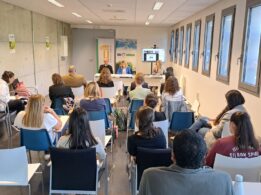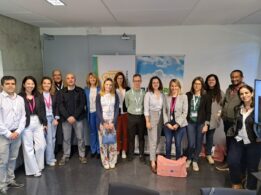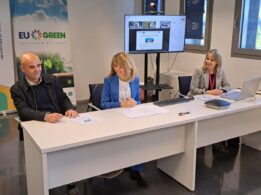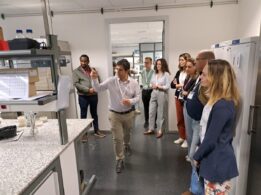La UEx reúne a expertos internacionales para proponer soluciones a los residuos de las industrias agroalimentarias
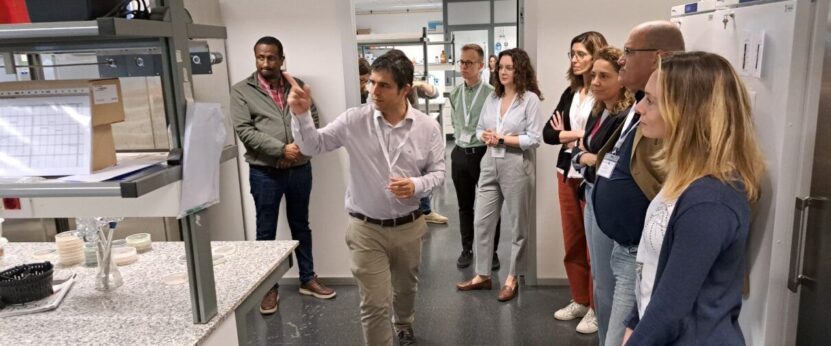
El workshop internacional: “Estrategias de obtención de compuestos bioactivos a partir de subproductos de la industria agroalimentaria” está organizado por la Universidad de Extremadura en el marco de la Alianza Europea de Universidades EU GREEN. El objetivo es promover proyectos de investigación conjuntos en el sector agroalimentario y en la reutilización y valoración de residuos
24/04/2024. Los días 23 y 24 de abril tiene lugar en los Institutos Universitarios de Investigación en Badajoz este seminario internacional, financiado por el proyecto SEED AGRIBIOPEP Bioactive peptides recovery from agrifood industry waste (Recuperación de péptidos bioactivos a partir de residuos de la industria agroalimentaria), un proyecto de gran relevancia para la misión y visión GREEN de la Unión Europea.
En este proyecto participan cinco universidades de la Alianza EUGREEN: la Universidad de Extremadura (España), la Universidad de Parma (Italia), la Universidad de Évora (Portugal), la Universidad de Wrocław University of Environmental and Life Sciences (Polonia) y la Universidad de Angers (Francia).
Al acto de bienvenida han asistido María de Guía Córdoba Ramos, vicerrectora de Investigación y Transferencia, y Francisco Hinojal Juan, project manager de la Alianza EU GREEN. Ambos han resaltado el potencial de Extremadura en el sector agroalimentario y, además, la vicerrectora ha destacado la importancia de AGRIBIOPEP para los objetivos del clúster 2 de la Alianza EU GREEN sobre agroalimentación sostenible. Así, este proyecto contribuirá a desarrollar una agenda común con recursos e infraestructuras compartidas y estimulará las colaboraciones en materia de investigación.
El proyecto AGRIBIOPEP, liderado por la Universidad de Extremadura y la investigadora principal María José Benito Bernáldez, propone soluciones para reutilizar y valorizar los altos porcentajes de residuos de las industrias agroalimentarias, estudiando fuentes alternativas y naturales de proteínas de bajo coste que reduzcan la dependencia y la huella ambiental que suelen dejar las proteínas animales.
De esta manera, los resultados de AGRIBIOPEP se alinean con la estrategia Horizonte Europa «de la granja a la mesa» y con las prioridades del «Green Deal» europeo, el Pacto Verde Europeo que pretende situar a la UE en el camino hacia una transición ecológica, con el objetivo último de alcanzar la neutralidad climática de aquí a 2050. Gracias a las proteínas obtenidas de subproductos y residuos de la agricultura y la agroindustria, así como a la obtención de biopéptidos mediante la utilización de tecnologías innovadoras que reduzcan el impacto medioambiental, se puede garantizar la sostenibilidad del sistema para alcanzar los Objetivos de Desarrollo Sostenible (ODS).
Las jornadas cuentan con participantes de estas cinco universidades además de FUNDECYT PCTEX, y de centros de investigación de las Universidades, como INURA (Instituto Universitario de Investigación de Recursos Agrarios de Extremadura), SONAS (Substances d’Origine Naturelle et Analogues Structuraux de la Universidad de Angers) y MED (Instituto Mediterrâneo para a Agricultura, Ambiente e Desenvolvimento de la Universidad de Evora), así como las empresas Ingulados, Troil, Smallops, Biofarm Fly y Vegenat Health Care.
UEx brings together international experts to propose solutions to waste from agri-food industries
The international workshop: Strategies to obtain bioactive compounds from by-products of the agri-food industry is organised by the University of Extremadura in the framework of the European University Alliance EU GREEN. The aim is to promote joint research projects in the agri-food sector and in the reuse and valuation of waste.
This seminar, financed by the SEED AGRIBIOPEP project Bioactive peptides recovery from agrifood industry waste, takes place on 23rd and 24th April at the University Research Institutes in Badajoz. This SEED project is of great relevance for the GREEN mission and vision of the European Union,
Five universities of the EUGREEN Alliance are participating in this project: the University of Extremadura (Spain), the University of Parma (Italy), the University of Évora (Portugal), the University of Wrocław University of Environmental and Life Sciences (Poland) and the University of Angers (France).
The welcome ceremony was attended by María de Guía Córdoba Ramos, vice-rector of Research and Transfer, and Francisco Hinojal Juan, project manager of the EU GREEN Alliance. Both highlighted the potential of Extremadura in the agri-food sector and, in addition, the vice-rector highlighted the importance of AGRIBIOPEP for the objectives of cluster 2 of the EU GREEN Alliance on sustainable agri-food. Thus, this project will contribute to the development of a common agenda with shared resources and infrastructures and will stimulate research collaborations.
The AGRIBIOPEP project, led by lead researcher María José Benito Bernáldez of the University of Extremadura, proposes solutions to reuse and valorise the high percentages of waste from agri-food industries, studying alternative and natural sources of low-cost proteins that reduce the dependence and environmental footprint that animal proteins usually leave behind.
In this way, AGRIBIOPEP’s results are aligned with the Horizon Europe strategy «from farm to fork» and with the priorities of the European Green Deal, that aims to put the EU on the path towards a green transition, with the ultimate goal of achieving climate neutrality by 2050. Thanks to proteins obtained from by-products and waste from agriculture and agro-industry, as well as the production of biopeptides through the use of innovative technologies that reduce the environmental impact, the sustainability of the system can be guaranteed in order to achieve the Sustainable Development Goals (SDGs).
The workshop is attended by participants from all the five universities as well as FUNDECYT PCTEX, and from research centres of the universities, such as INURA (University Institute for Research on Agricultural Resources of Extremadura), SONAS (Substances d’Origine Naturelle et Analogues Structuraux of the University of Angers) and MED (Instituto Mediterrâneo para a Agricultura, Ambiente e Desenvolvimento of the University of Evora), as well as the companies Ingulados, Troil, Smallops, Biofarm Fly and Vegenat Health Care.
